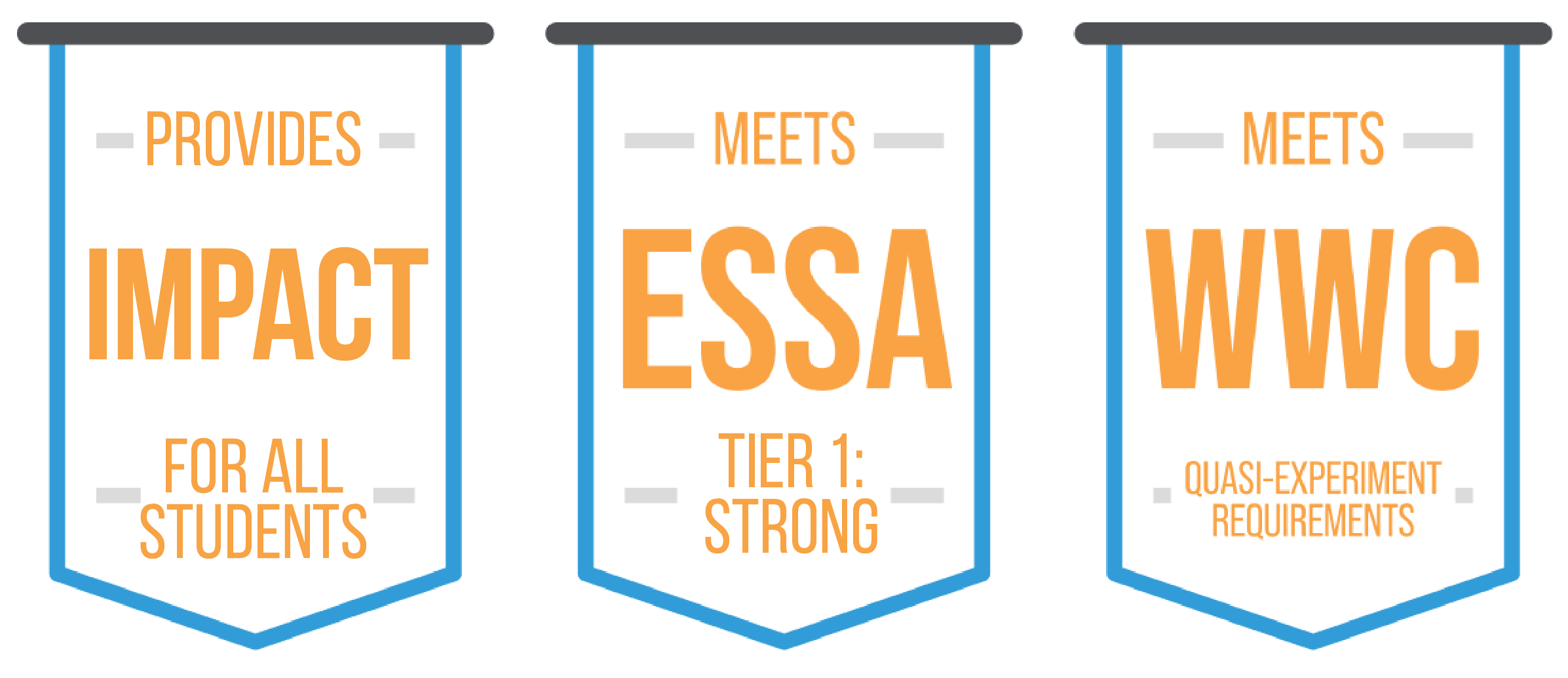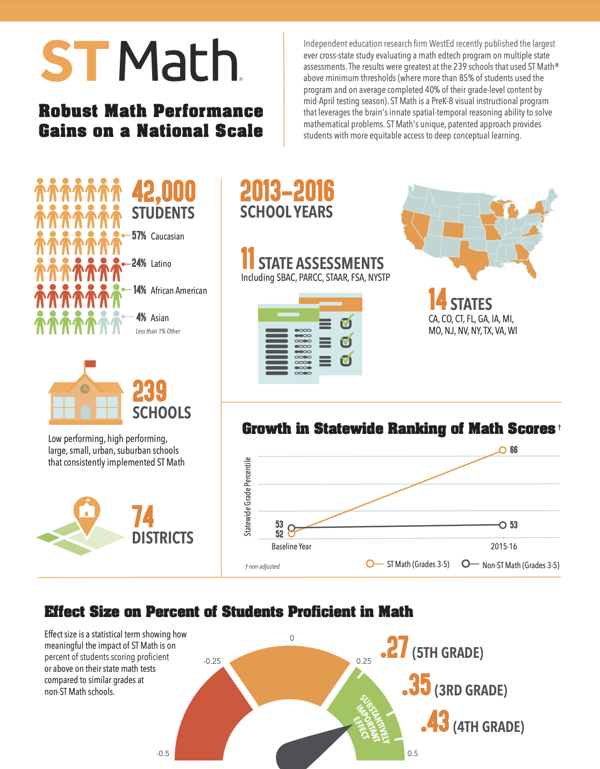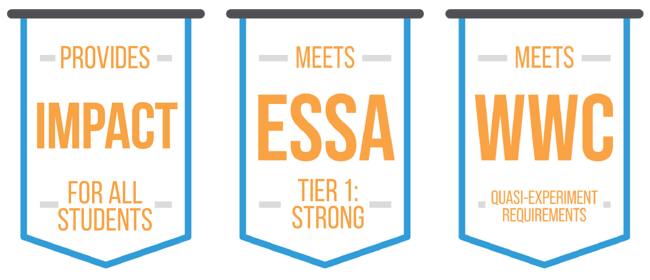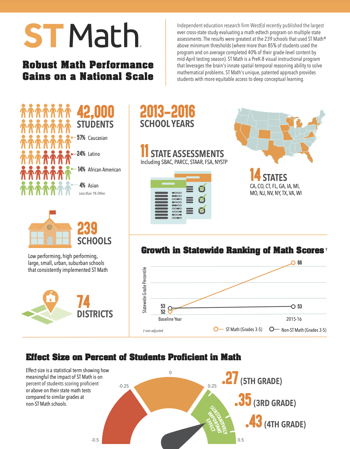Programs
Experience
Services
Educator Topics
Subscribe to the Newsletter
Subscribe to the Blog

At MIND Education, we believe every school should see results. Our Quasi-Experimental Design (QED) methodology extends far beyond the gold standard RCT and has been third-party validated to meet WWC and ESSA standards. This allows us to analyze every new cohort of schools, every year, using any standardized testing data. We continually evaluate and validate ST Math’s impact across various demographics, every year, ensuring our program delivers repeatable, consistent, equitable impact for all students.
Considered the “gold standard” of education research, experimental studies are rigorous but costly, rare, and take years to publish findings. This often results in data that covers only a small fraction of educational scenarios, grades, and assessments, and may be based on outdated program material.
MIND’s large-scale randomized control trial (RCT) study of ST Math, federally funded by the Institute of Education Sciences, is analyzed in full compliance with strict IES and What Works Clearinghouse specifications. The results proved a statistically significant impact on state assessments.
While our patented Spatial Temporal approach was proven over a decade ago, continued current evidence gathering is essential for evaluating programs in 2024. We continually provide this evidence to help educators make informed and confident decisions to improve student outcomes.
(QED) studies, ESSA Tier 2 and WWC supported, are more affordable, faster, and repeatable than RCT’s. MIND specializes and invests in rigorous QED’s, comparing outcomes in schools using ST Math to similar non-user schools.
We annually conduct QED studies on each new cohort of ST Math adopters, covering diverse educational scenarios, including district type, location, assessment, school performance, and demographics. All ST Math users, regardless of usage level, are subjects of these rigorous studies.
For example, our 2022 QED study matched comparison schools on a five-year performance trajectory before ST Math use. It confirmed ST Math's performance advantage and showed that on average, schools using ST Math recovered COVID-related learning losses by the 2021-22 academic year, compared to longitudinally matched peers.
This methodology has been replicated at the national scale for 22/23 with positive statistically significant results »

A quasi-experimental WestEd study of ST Math, which was verified by SRI to meet the What Works Clearinghouse (WWC) Tier 2 quality evidence standards was conducted in 2013-16.
Each year we release a national scale report on ST Math impact covering all new schools across the USA:
2016/2017 Math Outcomes Analysis »
2017/2018 Math Outcomes Analysis »
Tier 2 QED’s rely on state assessments, which are made public months after a school year ends and require multi-state samples and large control pools of non-user data, often unavailable in single districts. How can we perform a timely single district study? ESSA Tier 3 supports correlational studies which can report out, at a single district, the relationship between the amount of ST Math content students complete and their growth on 3rd party summative assessments given three times a year. This "impact rate" covers: one district, this year, on its students, using its chosen assessment, regardless of how they used ST Math.
We have conducted over 100 correlation studies with ST Math on a wide array of assessments to help districts evaluate their investment and understand students’ math outcomes. If you're interested in a correlational study for your district, please contact us to explore how ST Math can benefit your students.
Even at ESSA’s lowest evidence tier, we maintain a high standard of demonstrated rationale and explanation for how ST Math generates outcomes. Our scientific basis, independently validated certifications, and ongoing evaluation efforts ensure that ST Math remains the market’s most robust, reliable, and effective tool for improving math education in your schools.
ST Math includes:
Merely checking whether an edtech product ‘works or not’ fails to capture nuances of different educational scenarios, different amounts of usage, and the range of outcomes for different learners.
—Andrew Coulson, Chief Data Scientist, MIND Education, Read “More Than a Checkmark”
Program implementations vary but ST Math’s benefits are linear: the more students engage with the program, the better their outcomes. Students who complete more of their ST Math journey cover more math standards and accelerate learning compared to peers who invest less time. A study by Proving Ground, part of the Center for Education Policy Research at Harvard University, found that just 10 additional minutes of ST Math per week increased test scores.
ST Math’s Education Success Team provides tools and resources to ensure consistent, high usage. In Massachusetts, a proof-of-concept program showed success with 59 districts and 245 schools achieving 80-100% completion of their ST Math journey in a year, demonstrating the program’s effectiveness and scalability.
Every year, we evaluate the impact of ST Math usage at school, district and state levels all across the country, based on state and third party assessments. We believe that programs promising significant learning improvements in the real world require continuous real-world evaluation. These ongoing quasi-experimental study methods are verified by SRI to meet What Works Clearinghouse (WWC) quality evidence standards. Plus, as part of our robust efficacy portfolio, we have published research at all four levels of ESSA – including the gold standard RCT Tier 1, as well as quasi-experimental, correlational, and supporting research studies.


WestEd recently published the largest study of its kind to evaluate an education technology math program nationally, including over 150,000 students between 2013 and 2016. This national-level study expands upon previously published WestEd independent validations of the effectiveness of ST Math at the district level (Los Angeles Unified School District 2013) and statewide (California 2014).
The study looked at grades 3, 4 and 5 in 474 schools that started using ST Math between 2013 and 2015, and included 16 states where complete state standardized test and demographic data was publicly available to the researchers.
MIND Research Institute has standardized a third party validated quasi-experimental (QE) nationwide methodology. We apply it every year on our new school cohorts nationwide on all state assessments. In this way we validate ST Math's repeated effect on all types of districts and student demographics, on any type of math assessment, each year repeatedly.
MIND also provides current-year evaluations for any district at student-level on any assessment.
The headline and subheader tells us what you're offering, and the form header closes the deal. Over here you can explain why your offer is so great it's worth filling out a form for.
Remember:
The headline and subheader tells us what you're offering, and the form header closes the deal. Over here you can explain why your offer is so great it's worth filling out a form for.
Remember:
The headline and subheader tells us what you're offering, and the form header closes the deal. Over here you can explain why your offer is so great it's worth filling out a form for.
Remember:
ST Math is a unique, non-conventional program that adds math learning robustly in all different districts, in any district setting, in the full spectrum of implementations, and most importantly for all different subgroups equitably, adding value on the full range of math standards for each student, and all assessments.
Our approach is via maximal math outcomes studies: evaluate everyone, everywhere, every year. Show your results.

A quasi-experimental WestEd study of ST Math, which was verified by SRI to meet the What Works Clearinghouse (WWC) Tier 2 quality evidence standards was conducted in 2013-16 and again in 2017-18.
